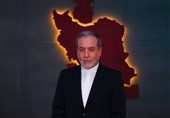Iran Open to Western Ties If Sovereignty Respected: Adviser
TEHRAN (Tasnim) – A senior adviser to Leader of the Islamic Revolution Ayatollah Seyed Ali Khamenei suggested that the Islamic Republic remains open to cooperation with Western states if they respect the country's sovreignty.
Ali Akbar Velayati, a former foreign minister, told the Financial Times that Iran is reassessing its foreign policy with an aim to foster better ties with European countries and others.
“The Islamic Republic is open to cooperation with any Western state that seeks genuine interaction with Iran, provided it respects our sovereignty and treats us as an equal,” Velayati said, following Israeli airstrikes on military targets across three provinces in Iran, which were thwarted by Iran's air defenses.
He emphasized Iran’s intention to balance relations with various regions. “We are actively redefining a new balance in relations with Western, Eastern, and developing countries. We welcome friendship with any country, from Europe to Asia or Africa,” he added.
Velayati dismissed the Israeli assault as “much ado about nothing” and said Israel was destabilizing the region. “In its role as a warmongering entity, the regime has the potential to set the volatile Middle East region on fire, and to create the spark that would set the regional powder keg alight,” he said.
Arab governments condemned Israel’s military aggression, cautioning that prolonged conflict could further destabilize the region. Velayati reiterated that Iran’s policy remains defensive. “We have never started any wars, as attested by history, and the Iran-Iraq war served as a vivid example of that policy. Still, we would confront an act of aggression in a way that would make any aggressor regret what they did,” Velayati added.
Iran’s government has focused on strengthening regional ties and mending strained relations with Europe. It has also signaled openness to resuming nuclear negotiations, despite ongoing tensions with the US.
Relations with Washington are likely to remain complex, with Tehran waiting to see the outcome of the upcoming US presidential election before making decisions about reviving nuclear talks. The 2015 nuclear deal, which was abandoned by former US president Donald Trump, saw sanctions reimposed on Iran, leading Tehran to accelerate its uranium enrichment.
“What (US President Joe) Biden says quietly, Trump says openly. We have experience in dealing with both and do not have a good history of negotiations with the US,” said Velayati. “We don’t believe in US goodwill. The US’s direct, unconditional support for Israel and its simultaneous calls for de-escalation through intermediaries are simply two sides of the same coin.”





